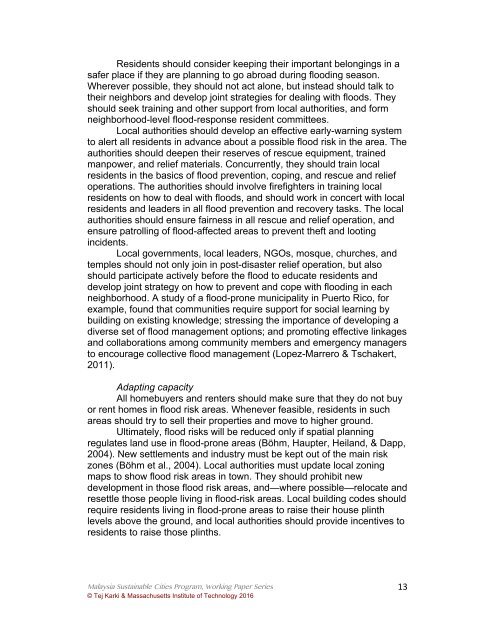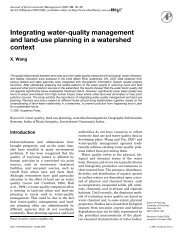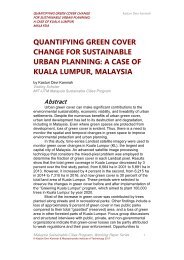Create successful ePaper yourself
Turn your PDF publications into a flip-book with our unique Google optimized e-Paper software.
Residents should consider keeping their important belongings in a<br />
safer place if they are planning to go abroad during flooding season.<br />
Wherever possible, they should not act alone, but instead should talk to<br />
their neighbors and develop joint strategies for dealing with floods. They<br />
should seek training and other support from local authorities, and form<br />
neighborhood-level flood-response resident committees.<br />
Local authorities should develop an effective early-warning system<br />
to alert all residents in advance about a possible flood risk in the area. The<br />
authorities should deepen their reserves of rescue equipment, trained<br />
manpower, and relief materials. Concurrently, they should train local<br />
residents in the basics of flood prevention, coping, and rescue and relief<br />
operations. The authorities should involve firefighters in training local<br />
residents on how to deal with floods, and should work in concert with local<br />
residents and leaders in all flood prevention and recovery tasks. The local<br />
authorities should ensure fairness in all rescue and relief operation, and<br />
ensure patrolling of flood-affected areas to prevent theft and looting<br />
incidents.<br />
Local governments, local leaders, NGOs, mosque, churches, and<br />
temples should not only join in post-disaster relief operation, but also<br />
should participate actively before the flood to educate residents and<br />
develop joint strategy on how to prevent and cope with flooding in each<br />
neighborhood. A study of a flood-prone municipality in Puerto Rico, for<br />
example, found that communities require support for social learning by<br />
building on existing knowledge; stressing the importance of developing a<br />
diverse set of flood management options; and promoting effective linkages<br />
and collaborations among community members and emergency managers<br />
to encourage collective flood management (Lopez-Marrero & Tschakert,<br />
2011).<br />
Adapting capacity<br />
All homebuyers and renters should make sure that they do not buy<br />
or rent homes in flood risk areas. Whenever feasible, residents in such<br />
areas should try to sell their properties and move to higher ground.<br />
Ultimately, flood risks will be reduced only if spatial planning<br />
regulates land use in flood-prone areas (Böhm, Haupter, Heiland, & Dapp,<br />
2004). New settlements and industry must be kept out of the main risk<br />
zones (Böhm et al., 2004). Local authorities must update local zoning<br />
maps to show flood risk areas in town. They should prohibit new<br />
development in those flood risk areas, and—where possible—relocate and<br />
resettle those people living in flood-risk areas. Local building codes should<br />
require residents living in flood-prone areas to raise their house plinth<br />
levels above the ground, and local authorities should provide incentives to<br />
residents to raise those plinths.<br />
Malaysia Sustainable Cities Program, Working Paper Series<br />
© Tej <strong>Karki</strong> & Massachusetts Institute of Technology 2016<br />
13






